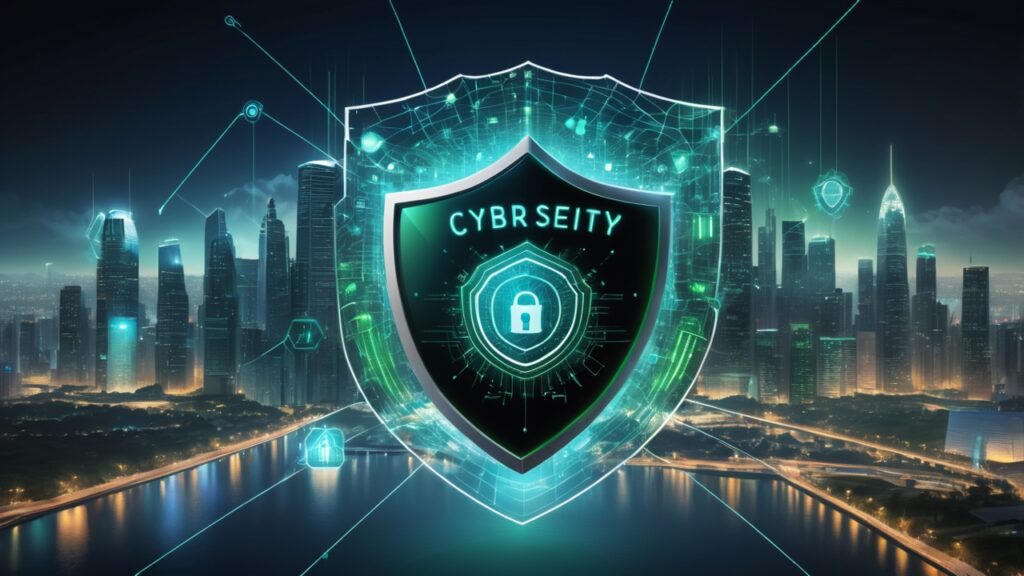The Role of Cyber Security in Smart Cities Development: Key Insights You Need to Know
Did you know that 60% of urban citizens in India worry about data security in smart cities? As cities become smarter, using new tech is key. Cyber security is vital for keeping cities safe and protecting citizens’ data.
This article will dive into cyber security’s role in smart city growth. We’ll look at keeping data safe and ensuring system integrity. We’ll cover the basics, challenges, laws, best practices, and future trends. Strong digital safety is essential for building sustainable smart cities in India.

Key Takeaways
- Cyber security is essential for the safety of smart cities.
- Data protection is a priority as cities integrate advanced technology.
- The rise of smart cities increases the risk of cyber threats.
- Regulatory frameworks are critical for enforcing cyber security measures.
- Best practices in digital safety are key to effective smart city development.
Introduction to Smart Cities
Smart cities are a big step forward in urban growth. They use technology to make life better for everyone living there. These cities have digital systems and data analysis at their core.
Technology helps improve services in areas like healthcare, transport, and energy. This makes life easier and safer for city residents.
Defining Smart Cities and Technology Reliance
Smart cities rely on advanced technologies. This helps them solve problems like traffic jams and manage resources better. Data collection and analysis help city leaders make smart choices.
This leads to more efficient and safer cities. It’s all about making the city work better for everyone.
The Integration of IoT in Urban Infrastructure
IoT plays a big role in making cities smart. It connects many devices to gather data on city operations. For example, sensors can check air quality, control street lights, and improve waste management.
By using IoT, cities can offer a better living experience. It focuses on being green and convenient for residents.
Understanding Cyber Security Basics
Cyber security is key in cities, protecting important data and services from threats. In smart cities, using good cyber security is a must. It helps city planners and IT folks keep networks and systems safe.
Importance of Cyber Security in Urban Settings
Cyber security is very important in cities. With more technology, like the Internet of Things (IoT), the risk of cyber attacks grows. A big data breach could mess up things like power, transport, and emergency services.
A strong cyber security plan keeps these services running smoothly. This makes cities safer and more trustworthy for everyone.
Key Components of Cyber Security Solutions
Good cyber security solutions have many parts working together. These parts help keep urban infrastructure safe. Here are the main cyber security components:
| Cyber Security Component | Function |
|---|---|
| Firewalls | Act as a barrier between trusted and untrusted networks, managing incoming and outgoing traffic. |
| Encryption | Protects data by converting it into a secure format that can only be read with a decryption key. |
| Identity Management Systems | Ensure that the right individuals have the appropriate level of access to sensitive information. |
| Multi-Factor Authentication | Adds an extra layer of security by requiring multiple forms of verification before granting access. |

By using these cyber security parts, cities can better defend against cyber threats. This helps build strong cyber security systems in urban areas. Knowing these parts helps create better data protection plans for smart cities.
Challenges in Smart City Cyber Security
Technology in smart cities is growing fast, leading to big cyber security challenges. This is because of the many connected systems and devices. As cities use the Internet of Things (IoT), new risks appear. These risks threaten the city’s infrastructure and the privacy of its people.
IoT Vulnerabilities in Smart City Systems
IoT devices help cities work better, but they also bring many risks. These devices often don’t have strong security, making them easy targets for hackers. If hacked, they can let hackers into bigger networks, putting important services at risk.
Fixing these IoT problems is key to keeping city systems safe and working well.
Data Privacy Concerns and Urban Cyber Threats
More connections mean more worries about keeping data private in smart cities. The big amount of personal info collected and stored puts people at risk. If this info gets leaked, it can hurt trust in the city’s management and tech.
To fight these dangers, cities need strong data protection rules and top-notch cyber security steps.
Real-World Case Studies
Many cyber attacks have hit smart cities worldwide, showing big weaknesses. These events teach us a lot about keeping urban tech safe. The City of Atlanta faced a big ransomware attack that stopped many city services. Dallas also had a breach that leaked important data.
These cases show how urgent it is for cities to boost their cybersecurity.
Notable Cyber Attacks on Smart Cities
- Atlanta – A ransomware attack halted city services, leading to a costly recovery process.
- Dallas – A cyber attack disrupted emergency services, showing the dangers of tech failures in cities.
- Barcelona – An attack on smart city systems leaked personal info of citizens.
Lessons Learned from Cyber Incidents
Learning from cyber breaches is key for cities to get better at fighting cyber threats. Important lessons include:
- Do proactive threat checks to find weaknesses before they’re used.
- Keep software up to date with regular updates and patches.
- Work with private companies to build a strong security network and share info.
By looking at these cyber attacks, cities can get ready for threats. They can strengthen their defenses and protect their systems.

Regulations Governing Cyber Security
In India, laws and regulations play a key role in making smart cities safe. These rules protect digital systems and build trust in urban services.
Overview of India’s IT Act
The IT Act of India was created in 2000. It sets rules for online activities and data safety. It also has penalties for cyber crimes.
This act helps create a culture of following the rules in smart city projects. It makes sure everyone knows their part in keeping data safe.
Upcoming Data Protection Bills Impacting Smart Cities
New data protection laws are coming into play. The Personal Data Protection Bill aims to protect personal data and set rules for handling it. This is important for smart cities.
These laws require cities and tech companies to follow strict guidelines. This makes sure citizens’ data is safe. It also makes everyone work together to prevent cyber threats.
Best Practices for Smart City Protection
Keeping cities safe is key, and smart city security best practices play a big role. Cities need strong ways to protect data and keep their networks safe. Two important steps are using data encryption and AI for threat detection.
Implementation of City Data Encryption
Data encryption is a strong defense against cyber attacks. It turns important data into codes that only the right keys can unlock. This makes it hard for hackers to get to the data, keeping cities safer.
AI-Based Threat Detection Systems
Using AI in cyber security helps cities watch their digital spaces closely. These AI systems spot threats quickly, better than old methods. They send out alerts fast, helping cities respond quickly and stay safe.
| Best Practices | Description | Benefits |
|---|---|---|
| Data Encryption | Encoding sensitive data to prevent unauthorized access. | Increased data security and protection against breaches. |
| AI-Based Threat Detection | Using AI algorithms to identify and respond to threats. | Real-time monitoring and faster threat response times. |
Future Trends in Cyber Security for Smart Cities
As cities grow more connected, they face new security challenges. It’s key to know about future cyber security trends to keep people and buildings safe. Learning about new tech like blockchain and IoT security will make cities safer.
The Role of Blockchain in Enhancing Security
Blockchain is a new way to keep data safe in smart cities. It works by spreading data across many places, not just one. This makes it hard for hackers to get to your data.
Using blockchain helps build trust. It makes sure city services work together safely and openly.
Advancements in IoT Security Technologies
More smart devices mean we need better IoT security. New ways to check if devices are real and strong security steps help fight off hackers. This makes city networks strong against attacks.
| Trend | Description | Impact on Smart Cities |
|---|---|---|
| Blockchain Technology | Decentralized security for data management | Protected citizen data and increased trust |
| Improved IoT Authentication | Advanced protocols for device security | Reduced vulnerability to cyber attacks |
| AI-Driven Security | Artificial Intelligence in monitoring threats | Proactive response to emerging threats |
As cities change, knowing about cyber security trends is key. Using blockchain and improving IoT security will help keep cities safe.
Conclusion
The growth of smart cities in India is a big step forward in urban planning. But, it all starts with a strong focus on cyber security. This ensures the safety of important infrastructure, keeps data safe, and builds trust among residents.
As cities get more connected with new tech, cyber security is more important than ever. It protects sensitive info and keeps the city’s systems strong. This is key for smart cities to succeed.
It’s critical for leaders and planners to mix cyber security with new tech. This mix is essential for making smart cities sustainable, driving innovation, and creating a safe future for India’s cities.
FAQ
What is the role of cyber security in the development of smart cities?
Cyber security is key for smart cities. It keeps sensitive info and services safe from cyber threats. This ensures the city’s systems work well together, making life better for everyone.
What are the main cyber security challenges faced by smart cities?
Smart cities face big cyber security challenges. These include weak IoT security, privacy issues, and threats from cyber attacks. If not handled right, these can harm essential services.
How does IoT influence cyber security in urban settings?
The Internet of Things (IoT) plays a big role in urban cyber security. It connects many devices, making them targets for hackers. It’s important to strengthen IoT security to keep cities safe.
What are best practices for enhanced cyber security in smart cities?
For better cyber security, smart cities should use data encryption and AI for threat detection. They should also have strong digital safety plans for their infrastructure.
How can data encryption improve smart city security?
Data encryption makes smart cities safer by keeping info safe from hackers. It protects personal and city data, building trust among residents.
What are the upcoming regulations affecting cyber security in smart cities in India?
In India, new rules like the Personal Data Protection Bill and IT Act changes are coming. They aim to better protect data and define roles for city officials and tech companies.
Can blockchain technology enhance cyber security measures in smart cities?
Yes, blockchain can boost cyber security in smart cities. It offers secure, decentralized data protection. This makes urban data management more reliable and safe.
What are urban cyber threats and how do they impact residents?
Urban cyber threats are attacks on smart city systems. They can cause data breaches, disrupt services, and steal personal info. This can make residents feel unsafe and lose trust in their city.

